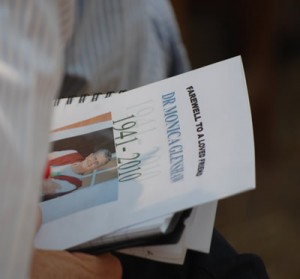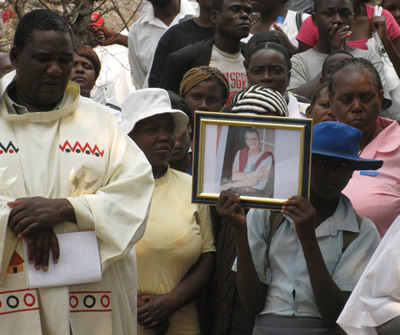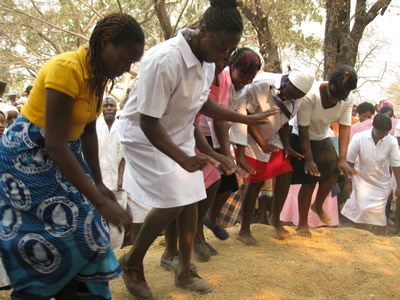
Funeral programme
Dr Monica Glenshaw, a friend for many years, died on Monday September 20th, weeks shy of her 69th birthday. When I heard the news, a day after her death, I felt the wind knocked out of me. I knew Monica was battling cancer but didn’t vaguely have a measure of how aggressive her adversary was. These past few days I’ve realised that there are a lot of things I didn’t know about Monica. She was a private and self-deprecating woman who kept the different areas of her life distinct from each other. Medical, family and social lives seldom intersected. But given that Monica was happy to answer direct questions directly, there are perhaps other reasons why I found myself so uninformed of her Amazing Achievements.
When she was in town, I think Monica was happy to put the responsibility and challenges of her rural hospital life out of her mind for a few days of R&R. She didn’t deflect questions about herself, she just seemed to slip her own in first. She was curious and interested in what we were doing in our personal and work lives, and would soon have me prattling away about my concerns and passions. I frequently made the mistake of not reversing the roles. Happily colleagues at Kubatana got her to answer one of their Inside/Out questionnaires in 2009, so we can go back and read a little about Monica, in her own words.
I met with some of Monica’s closest friends on Tuesday night. We were miserable but couldn’t help but spend quite a lot of the time laughing about Monica’s quirky side. She was a woman who travelled extremely light – partly because she needed very little and partly because she trusted others to deal with logistics when she wasn’t at work. On one occasion Monica arrived at an airport in Canada, visiting from Zimbabwe – all she had brought with her for the visit, was a clean pair of knickers and a gift for her friend!
On Wednesday afternoon I went to a memorial mass for Monica at the Lady of the Wayside Church in Mt Pleasant, Harare. We were an eclectic mix of family, artists, doctors, nuns, gay men, lesbians, human rights activists and many others. Monica’s brother Mike Glenshaw and her friend John Miller shared details of her life – some of it amusing, much of it illuminating.
I learned that Monica’s distinctive way of speaking was courtesy of a cleft palate, and that she had been hard of hearing since childhood. She wanted to be a vet but didn’t have good enough grades to pursue that dream. Instead she studied agriculture, and worked for a time as a dairy manager – or dairy maid as she liked to joke. After some years she realised that fulfillment lay elsewhere, and enrolled to study medicine at Wits University in Johannesburg. Appalled by the politics of the apartheid regime in South Africa, Monica moved to Zambia in the ’70s to practice medicine there. In 1985, a few years after Zimbabwe’s independence, she accepted a position as Medical Superintendent at Murambinda Mission Hospital, where she settled in for the long haul. Some years later she was appointed District Medical Officer for Buhera, and thereafter took on a workload meant for two.
That evening we gathered with more of Monica’s friends to have a few drinks and share how our lives had been enriched by hers. She loved a party and more than a few drinks, unwinding and socialising with her friends. Those of us who saw more of the off-duty Monica could be forgiven for overlooking the Fabulousness of her doctoring work. For some of her family it was a wonderful opportunity to learn about another side of Monica.
The following morning a group of us drove the 3+ hours down to Murambinda Hospital for her funeral and burial. It was to be a memorable experience for all of us.

Graveside
The turnout was amazing. The emotion and respect expressed by colleagues and friends from the medical side of her life was inspiring. Looking around at the school children who arrived to join the service after school ended, I wondered how many of them Monica had delivered, immunised, medicated or patched up during her 25 years at the hospital.
Present at the funeral were many hundreds of people, including hospital board members, nursing staff, mission staff, NGO partners, district police, friends, family, clergy, nuns, local business owners, community residents, the local chief, the District Administrator and Eric Matinenga, MP for Buhera. Speakers drawn from this assembly spoke of their huge respect for the enormous contribution Monica had made to the hospitals and clinics in her district, and the innovative public health initiatives she pioneered or supported. A spokesman for the Ministry of Health shared that practitioners from a variety of fields visited Murambinda to learn from the systems and methods in practise here. Speakers described Monica as a committed team player, mentor, visionary and leader in the field of rural medicine; as rigorous, forthright, brave,determined and tireless.

Dancers graveside
Monica lived in a simple, neat home on the hospital grounds and kept her personal possessions to a minimum. She had a famously limited wardrobe – as a friend recalled, the only thing to change over the years he knew her, was the colour of her fleecy.
Monica loved animals and became very attached to her dogs. A few years ago she was given a Jack Russell pup and the two quickly became inseparable. If Monica was coming to stay, so was Nutu – it was not negotiable. Monica must have had great peace of mind knowing that Nutu was going on to live with one of her closest friends.
There’s no doubt than many of us have been marked by Monica’s life and death. She had strong close bonds with colleagues, friends and family and all will sorely miss her company in the days ahead.
For more images from the funeral, follow this link.
Also, a lovely aggregation of Monica pics here.
http://www.facebook.com/album.php?aid=25467&id=100001063012591&l=77b504a7b1












